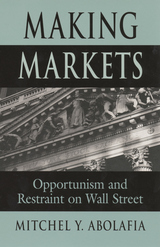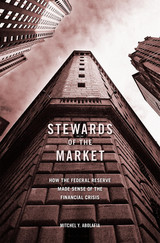
In the wake of million-dollar scandals brought about by Michael Milken, Ivan Boesky, and their like, Wall Street seems like the province of rampant individualism operating at the outermost extremes of self-interest and greed. But this, Mitchel Abolafia suggests, would be a case of missing the real culture of the Street for the characters who dominate the financial news.
Making Markets, an ethnography of Wall Street culture, offers a more complex picture of how the market and its denizens work. Not merely masses of individuals striving independently, markets appear here as socially constructed institutions in which the behavior of traders is suspended in a web of customs, norms, and structures of control. Within these structures we see the actions that led to the Drexel Burnham and Salomon Brothers debacles not as bizarre aberrations, but as mere exaggerations of behavior accepted on the Street.
Abolafia looks at three subcultures that coexist in the world of Wall Street: the stock, bond, and futures markets. Through interviews, anecdotes, and the author’s skillful analysis, we see how traders and New York Stock Exchange “specialists” negotiate the perpetual tension between short-term self-interest and long-term self-restraint that marks their respective communities—and how the temptation toward excess spurs market activity. We also see the complex relationships among those market communities—why, for instance, NYSE specialists resent the freedoms permitted over-the-counter bond traders and futures traders. Making Markets shows us that what propels Wall Street is not a fundamental human drive or instinct, but strategies enacted in the context of social relationships, cultural idioms, and institutions—a cycle that moves between phases of unbridled self-interest and collective self-restraint.

A fast-paced, behind-closed-doors account of the Federal Reserve’s decision making during the 2008 financial crisis, showing how Fed policymakers overcame their own assumptions to contain the disaster.
The financial crisis of 2008 led to the collapse of several major banks and thrust the US economy into the deepest recession since the Great Depression. The Federal Reserve was the agency most responsible for maintaining the nation’s economic stability. And the Fed’s Open Market Committee was a twelve-member body at the epicenter, making sense of the unfolding crisis and fashioning a response. This is the story of how they failed, learned, and staved off catastrophe.
Drawing on verbatim transcripts of the committee’s closed-door meetings, Mitchel Abolafia puts readers in the room with the Federal Reserve’s senior policymaking group. Abolafia uncovers what the Fed’s policymakers knew before, during, and after the collapse. He explores how their biases and intellectual commitments both helped and hindered as they made sense of the emergency. In an original contribution to the sociology of finance, Stewards of the Market examines the social and cultural factors that shaped the Fed’s response, one marked by missed cues and analytic failures but also by successful improvisations and innovations.
Ideas, traditions, and power all played their roles in the Fed’s handling of the crisis. In particular, Abolafia demonstrates that the Fed’s adherence to conflicting theories of self-correcting markets contributed to the committee’s doubts and decisions. A vivid portrait of the world’s most powerful central bank in a moment of high stakes, Stewards of the Market is rich with insights for the next financial downturn.
READERS
Browse our collection.
PUBLISHERS
See BiblioVault's publisher services.
STUDENT SERVICES
Files for college accessibility offices.
UChicago Accessibility Resources
home | accessibility | search | about | contact us
BiblioVault ® 2001 - 2024
The University of Chicago Press









